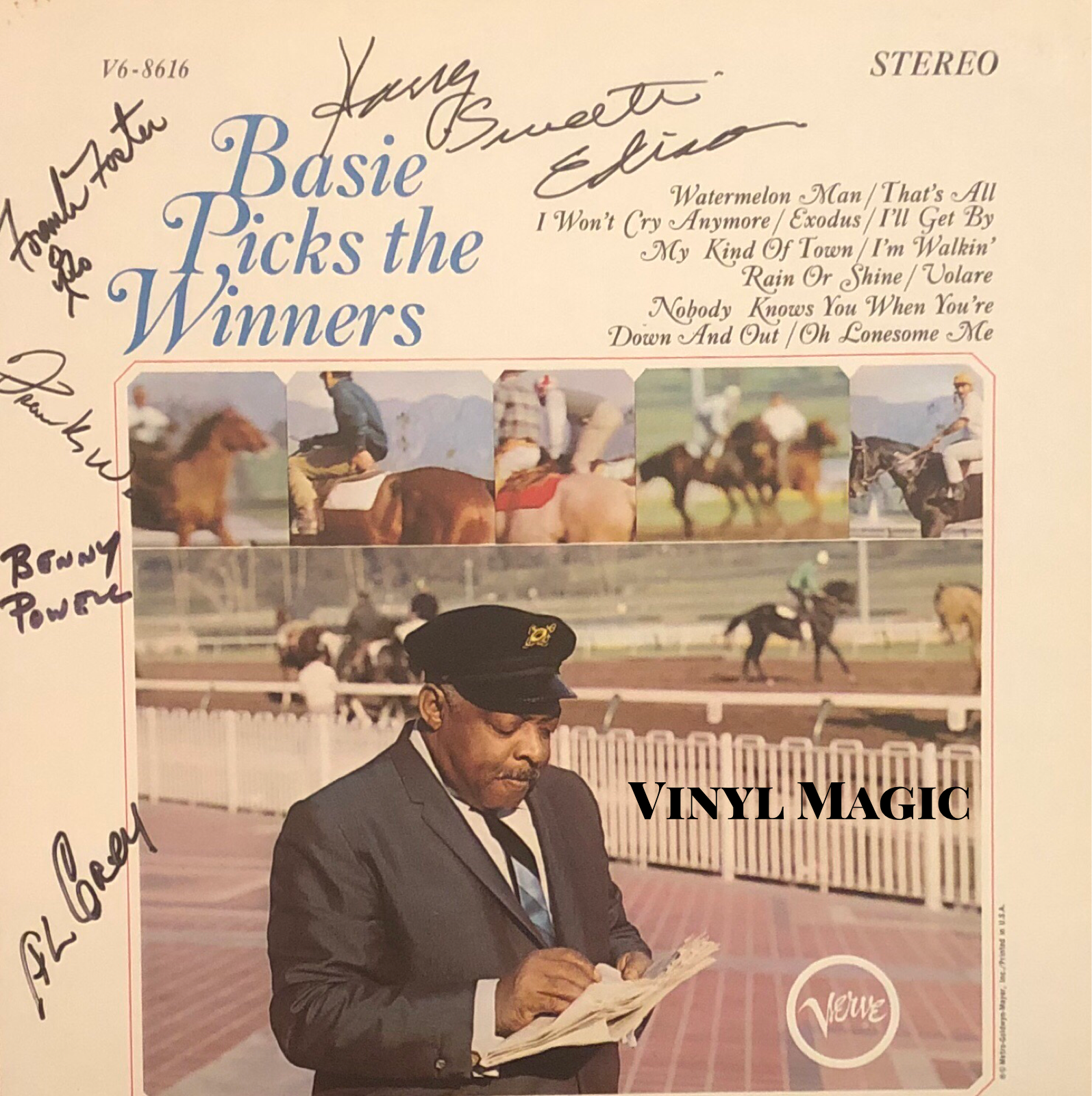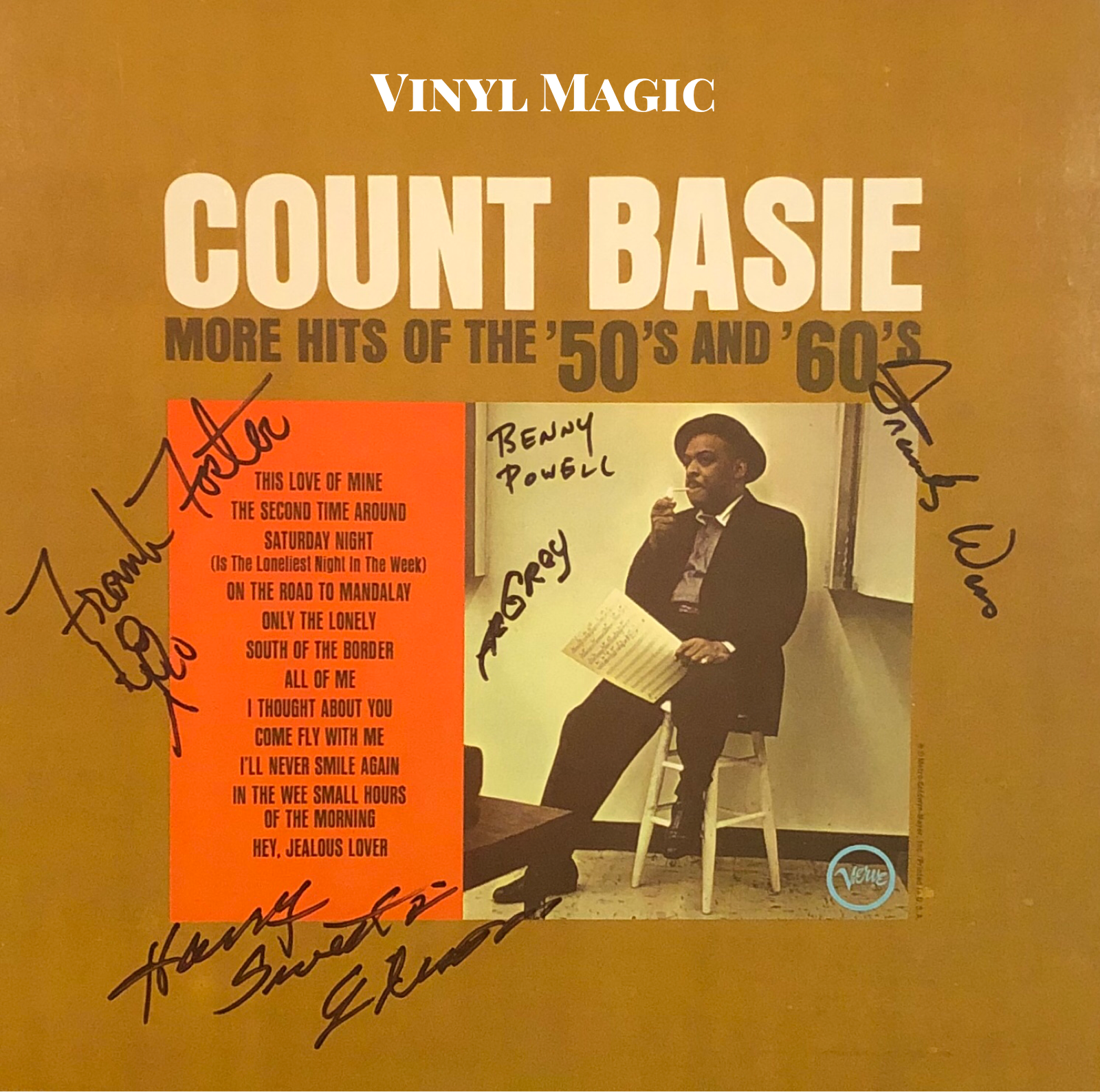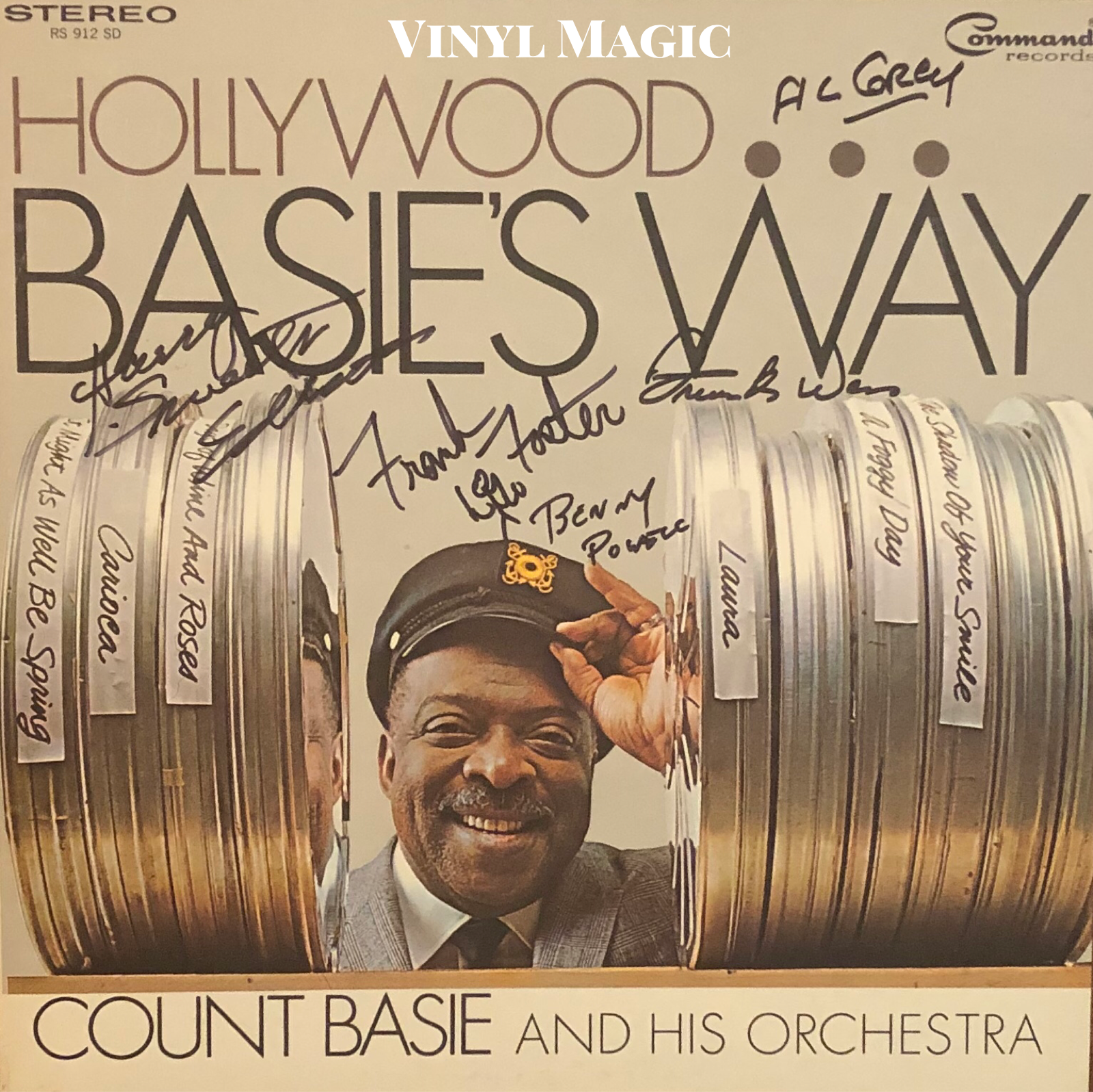Harry “Sweets” Edison and Me…
Music is about style. Like if I were to play with Frank Sinatra, I would play the way he sings, or do something complementary to the way he sings. But I wouldn't go and play with Frank Sinatra at breakneck speed... The way you play behind a singer is like the way Harry "Sweets" Edison did with Frank. When Frank stopped singing, then Harry played. A little before and a little afterwards, but not ever over him. You never play over a singer. You play between.
Miles Davis
The Legend: From The Pen Of Benny Carter (1961) signed by Sweets, Frank Foster, Al Grey, Benny Powell, Frank Wess
Sweets [Edison] can say more with one note than any other Jazz player alive... an approach that stresses simplicity, glorious tone, natural potency and an unmatched affinity. He is a unique stylist in our music.
Oscar Peterson
On My Way & Shoutin’ Again! (1963) signed by Sweets, Frank Foster, Al Grey, Benny Powell, Frank Wess
Nobody else even approaches the trumpet like he does: never too much and always plenty. He’s the greatest trumpet player to play along with singers. He exactly knows how to play with you, how to answer you about what you just sang … On top of that, he has some great sense of humour, both as a musician and as a man. Every time I see him, I’m laughing so much. “Sweets” is impeccable and incomparable.
Ella Fitzgerald
Basie Picks The Winners (1965) Sweets, Frank Foster, Al Grey, Benny Powell, Frank Wess
Easin’ It (1962) signed by Sweets, Frank Foster, Al Grey, Benny Powell, Frank Wess
The big bands had arrangements, the great Duke Ellington, Tommy Dorsey, Jimmy Dorsey, Benny Goodman—all the bands had music written out. You would have eight bars to play a solo, then you had to sit down and play the written arrangement. We didn’t have much written music in the Basie Band, so everybody played solos. I think that’s the reason why so many great soloists came out of The Count Basie Band. We weren’t good readers anyway, that included Count Basie, so we just had a ball.
Harry "Sweets" Edison
More Hits Of The ‘50s And ‘60s (1963) signed by Sweets, Frank Foster, Al Grey, Benny Powell, Frank Wess
The Jazz Soul Of Porgy & Bess (959) signed by Sweets, Art Farmer, Herbie Powell
Billie was a fantastic singer and a beautiful lady. One of the highlights of my career was when she sang “Lover Man” and asked me to play with her. Can you imagine that? I was certainly the youngest cat in the band. Wow!
Harry "Sweets" Edison
Sweets For The Sweet (1965) unsigned
Sweets For The Sweet back cover signed by Sweets
From Count Basie to Duke Ellington, Billie Holiday to Ella Fitzgerald, Frank Sinatra to Fred Sanford (yes, he was the music director for Redd Foxx in the 1970s in Las Vegas!), Harry "Sweets" Edison was a first call trumpet. With his signature shadings and Harmon mute, Sweets could do no wrong. Born in Columbus, Ohio, Harry started playing trumpet with local bands before moving to New York City in 1937 to join the Count Basie Orchestra, He would remain with Bill Basie for the next thirteen years and participated on many of their seminal jazz recordings. Sweets' sound and phrasing was simple, sparse and distinctive, and he was a staunch believer in "less is more", which he learned from Basie. He told Sweets once, ""You sound good ... if you find a note that sounds good ... play the same damn note every night!" It became Sweets' mantra and it served him well over his sixty year career.
Jawbreakers (1962) signed by Sweets
Hollywood Basie’s Way (1967) Sweets, Frank Foster, Al Grey, Benny Powell, Frank Wess
There is controversy over the origin of Harry Edison's nickname. Longtime Basie guitarist Freddie Green offered his explanation in 1985:
" 'Pres' (tenor saxophonist Lester Young) gave him that name, 'Sweetie Pie'...a tribute to his trumpet style,...a sound “so sweet it could rot a baby’s teeth." Later on, Basie... nicknames him 'Sweets'."
Drummer Elvin Jones proffered his version in 2003:
"Sweets had so many lady friends, he was such a handsome man. He had all these girls all over him all the time, that's why they called him Sweets."
While confirming Lester Young as the source for his moniker, for his part, Sweets demurred, “When Lester (Young) loved somebody in the band, he gave you a nickname like... “Sweetie Pie” and I still don’t know why...”
To me, Elvin's description seems the most plausible. Perhaps, Sweets was being modest as a gentleman never discusses his liaisons, however prolific…
The Trumpet Kings Meet Joe Turner (1974) signed by Sweets, Clark Terry
When the Basie Orchestra went on hiatus in 1950, Sweets moved to Los Angeles and worked studio sessions, appearing on Billie Holiday's Songs For Distingue Lovers (1957), Ella Fitzgerald's Cole Porter Songbook (1956) and Frank Sinatra's Swing Easy (1954),Songs For Swingin' Lovers (1956) and Only The Lonely (1958), among many other recordings. Sinatra's arranger, Nelson Riddle was given strict instructions directly from La Voce: "For Sweets, you have to give him a special treatment. He plays what and whenever he wants. Don't give him any charts. He has the complete freedom of everything he's going to play or not."
Basie’s Beatle Bag (1965) signed by Sweets, Frank Foster, Al Grey, Benny Powell, Frank Wess
Sinatra was adamant that Sweets record with him, even though Sweets couldn’t read the charts. As a remedy, Sinatra paid for music lessons although it is unclear if Sweets ever really learned to read music. It didn’t matter. Sweets could play so beautifully and the Sinatra-Riddle-Edsion collaboration was remarkable on “Blues In The Night.” “Come Fly With Me,” “I Thought About You,” “I’ve Got You Under My Skin” and most of the essential Sinatra tracks from 1953-1958, the golden age in Sinatra’s unparalleled discography. Sweets also played on the soundtracks of the Sinatra fils Man With The Golden Arm, Pal Joey and Joker Is Wild. Their musical relationship was as simple and symbiotic as Sinatra once described, “If you hear a hole, Harry, fill it.”
Simply Sweets (1977) signed by Sweets
I saw Sweets many times in the 1990s at jazz clubs in New York City, The Iridium, Blue Note and Birdland, among them. Several times he performed with Lionel Hampton and The Golden Men Of Jazz featuring vibraphonist Lionel Hampton, pianist Hank Jones, tenor saxophonists James Moody and Jimmy Heath, trombonist (and fellow Basie alum) Al Grey, bassist Milt Hinton and drummer Grady Tate, all esteemed musicians and leaders in their own right. The shows were mostly jam sessions and each artist stretched out on a tune which was closely identified with him: Lionel Hampton on "Flying Home", James Moody on "Moody's Mood For Love" and Sweets on a beautiful ballad treatment of "I Wish I Knew."
Edison’s Lights (1976) signed by Sweets
After each show, I would visit with Sweets. He was tall, thin and wore a small pony tail. Gracious and unassuming, Sweets enjoyed looking at the Basie albums. "But I'm not playing on this one", he gently protested. "Yes, but all your friends are" I reminded him as I pointed out the signatures of his compadres Frank Foster, Frank Wess, Benny Powell, and Al Grey. "Yes, we had some great times together" Sweets said as he signed and signed...
John Danville’s Quartet (1978) signed by Harry
On the liner notes to John Darvilles Quartet, Sweets was quoted, "They keep saying mainstream jazz and progressive jazz but I think music is music. All these names are just new names for music. If it sounds good, and it is good, then it's just music. I can't find another name for jazz, no more than just good music."
Harry "Sweets" Edison, a tasteful trumpet stylist, a composer of uncommon talents and a purveyor of much more than good music.
Just Friends (1975) signed by Sweets, Roger Kellaway
Choice Harry "Sweets" Edison Cuts (per BK's request):
https://www.youtube.com/watch?v=SfTJEwFUYdU
"Centerpiece" written and performed by Sweets with Coleman Hawkins 1964
“Sooner or later, when you play a Blues, you have to play this melody, its automatic." - Kenny Burrell
https://www.youtube.com/watch?v=SPu0zkfmglQ
"I've Got You Under My Skin" Sinatra Sings, Sweets Plays
https://www.youtube.com/watch?v=hkxniyfKQ-E
"Blues In The Night" Sinatra Sings, Sweets Plays 1958
https://www.youtube.com/watch?v=14C7A7V6q8k
"Willow Weep For Me" Sweets Live
https://www.youtube.com/watch?v=lLN2r_5zixc
"I Wish I Knew" Sweets Live at The Iridium 1997
https://www.youtube.com/watch?v=hbmUnXkiAVo
"Lover Man" Billie Holiday with Sweets 1956
https://www.youtube.com/watch?v=nEZpUHUII6c
"Fly Me To The Moon" Frank Sinatra with Count Basie and Sweets 1964
https://www.youtube.com/watch?v=THmLkXB9Glk
"Ow" written by Sweets and performed with Dizzy, Oscar, Clark Terry et al.
https://www.youtube.com/watch?v=IQuVhJRuIq8
"Dirty Butt Blues" 1977 - an homage to George O'Malley
Pres & Sweets (1955) signed by Harry Sweets Edison

















